National Centre of Competence Engineering
The NCCE focused on R&D activities necessary to improve the competitiveness of the Czech engineering industry in the medium and light industry segments. Its aim is, through the joint implementation of applied R&D, to boost and further develop the cooperation of businesses and research organisations. The NCCE will address issues and topics important for future machinery innovations. Its focus will be on increasing the performance and precision of machinery, reducing energy intensity, production process automation, cost optimisation, and reflecting the trends of Industry 4.0.
Mechanical engineering is one of the key sectors of the Czech economy, with a high potential for further growth and strengthening the competitiveness of Czech industry. The importance of mechanical engineering for the Czech Republic and its innovation potential is firmly anchored in the Czech National Strategy for Smart Specialization S3 – document 1, document 2. The production of medium and light industry businesses is mainly intended for export and represents a major part of the GNP. The aim of the NCCE was to perform excellent research and development (“R&D”) leading to the enhancement of the competitiveness of industrial businesses from this sector and improving the performance and export capability of the Czech economy.
The NCCE was focused on increasing the performance and precision of machinery, reducing their energy intensity, production process automation, reducing innovation cycles, cost optimisation and reflecting trends within Industry 4.0. The NCCE performed machine and technology parameter measurement and analyses, mathematical modelling, mechatronic system development and control, machine design and construction, including prototypes and verification, and new material and production technology development and application.
The NCCE followed up on the long-term cooperation between top teams of leading Czech research organisations (ROs) and engineering industry businesses (IBs) in the field of advanced manufacturing technologies. The NCCE associated 9 ROs and 17 IBs together. Their previous cooperation was in the form of joint bilateral or multilateral R&D projects, or on the basis of contract research. The NCCE makes use of the synergistic effects offered by the planned multidisciplinary cooperation of specialised teams, including the use of the specific material and technical resources of each project participant.
The NCCE effectively concentrated existing R&D capacities to achieve higher-order innovations. These innovations were integrated into the product portfolio of participating IBs to increase their competitiveness in demanding global markets.
The intention of all NCCE participants was to promote its long-term and systematic development. This has been taken into account when conceiving the Centre’s technical orientation and each participant’s involvement, when defining key R&D activities that was in line with long-term trends and reflect the current needs of the application domain. The strategic research agenda was further specified, and cooperation between ROs and IBs was enhanced in the course of NCCE operations and the work on partial research and development projects.
The implementation of planned activities, as part of the announced National Centres of Competence 1 programme for 2019-2022 and the continuation of activities in the follow-up NCCE 2 project from 2023 to 2028., is a special opportunity to achieve these objectives. In addition to R&D conducted as part of the NCCE project, other activities of NCCE participants were in progress, such as cooperation between ROs and industrial companies in other joint R&D projects, including international projects. Commercial activities of the ROs were also focused on businesses outside the NCCE consortium.
The NCCE’s primary aim was conducting excellent industrial R&D. To speed up the transfer of results and knowledge to industrial practice, cooperation between consortium members was coordinated. The NCCE supported technology transfer sites operating in each RO. The NCCE was progressively propose and build a joint marketing and publicity strategy acceptable to all participants and inform a wide public of professionals of the results achieved by the Centre as well as the Centre’s technical background through selected means and procedures (Internet, promotional materials, workshops, publications, etc.).
The NCCE participants have economic (financial) as well as non-economic (socially important) benefits from the creation of the NCCE and its activities.
Key Research Topics
The research organisations and companies of the NCCE Consortium have identified and defined these five key research topics in which they carried out their research, development, and results:
- RT1 – Measuring Methods of Machines and Technologies – The research of methods for measuring and analysing the parameters of machines, equipment and technologies.
- RT2 - Mechatronics and Control – The research of mechatronic systems of mechanisms and machines.
- RT3 – Virtual Models of Machines and Technologies – The research of mathematical modelling of machines, technologies and physical processes that are significant for machine units.
- RT4 – Machine Design - Research, development, prototyping and verification of new concepts and designs of machines, equipment and technologies for the processing industry.
- RT5 – New Materials and Their Processing – The research and development in the field of new materials and the technologies of their manufacturing and processing.
FME CTU in Prague was involved in 10 sub-projects:
- No. 23 – Machines for intelligent production (leader Jiří Švéda)
- No. 24 – Digital Twin of Machine Tool and technology process (leader Matěj Sulitka)
- No. 29 – Effective manufacturing processes (leader Pavel Zeman)
- No. 30 – Machine for machining and additive technologies (leader Jan Smolík)
- No. 31 – Additive manufacturing of hardened welds on refined steels – analysis of WAAM and DED technology (leader Jan Smolík)
- No. 51 – Machines for intelligent production (leader Jiří Švéda)
- No. 52 – Digital Twin of machine tool and technology (leader Matěj Sulitka)
- No. 53 – Efficient production processes (leader Pavel Zeman)
- No. 54 – Machine for machining and additive technologies (leader Jan Smolík)
- No. 55 – Industrial repair and design of metal parts using additive manufacturing technology of WAAM, DED and DLMS (leader Jan Smolík)
Selected project results
- A total of 57 functional samples, 30 verified technologies, 2 software, 1 Methodology certified by an authorized body, 7 utility models, 10 prototypes and 28 other results were created within the project. A total of 135 outputs were implemented.
- The main results are applicable in practice. After being implemented in practice, they have the potential to help project participants increase their competitiveness. Practical use is expected, especially for prototypes that are directly intended for subsequent production and use. Additionally, verified technologies and certified methodology, as well as other results, will be used in practice and will serve users to achieve better results in production and strengthen their competitiveness. The use of the project's outputs in practice will further lead to increasing the performance and accuracy of machines and equipment, reducing the energy consumption of technologies, automating production processes, shortening innovation cycles, and also to cost optimisation of many processes and inputs.
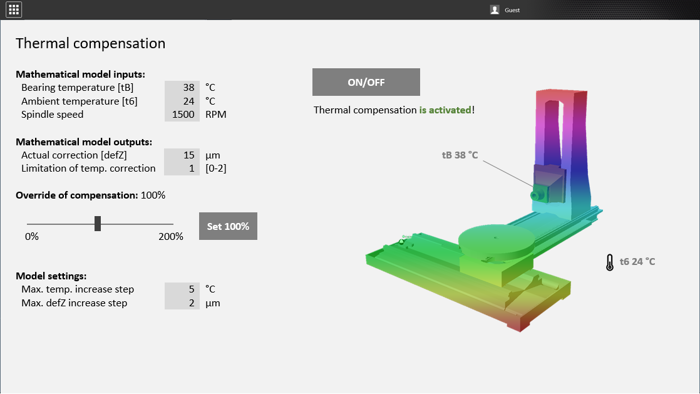
Functional sample Machining Centre Thermal Error Compensation with Automatic Recalibration – Implementation of temperature
compensations in the WHT110 machine equipped with the TOSControl add-on system
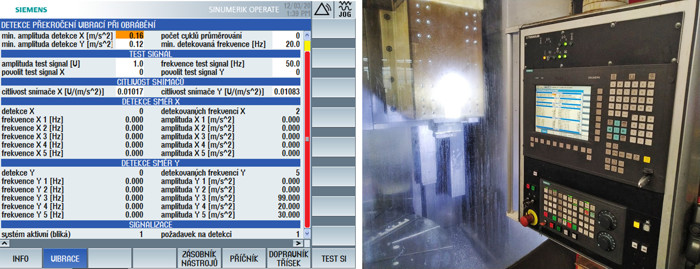
Functional sample System for Process Measurement of Vibrations of the Ram of a Vertical Lathe and Visualization of Results
within the Control System – Example of the created HMI screen and screen on the user panel of the Basicturn machine control
system

Functional sample Cutting Forces Calculator with Decomposition into Machine Axes Implemented in the Machine Tool Operator
Environment – Implementation of the cutting force calculator into the Sinumerik control system
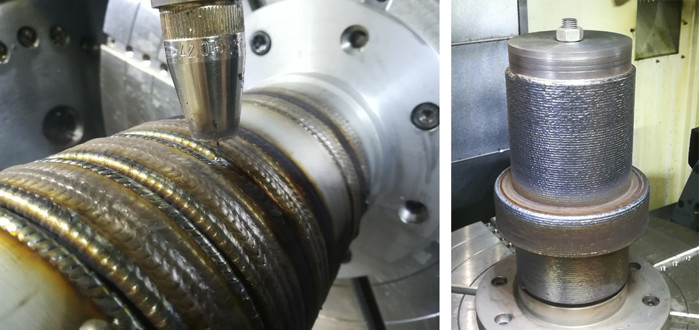
Verified technology Hybrid Technology for the Production of a Steel Tube for Bearing Storage with Integrated Internal Cooling
Channels for a Liquid Medium – Production of spindle housing: welding of material using WAAM technology
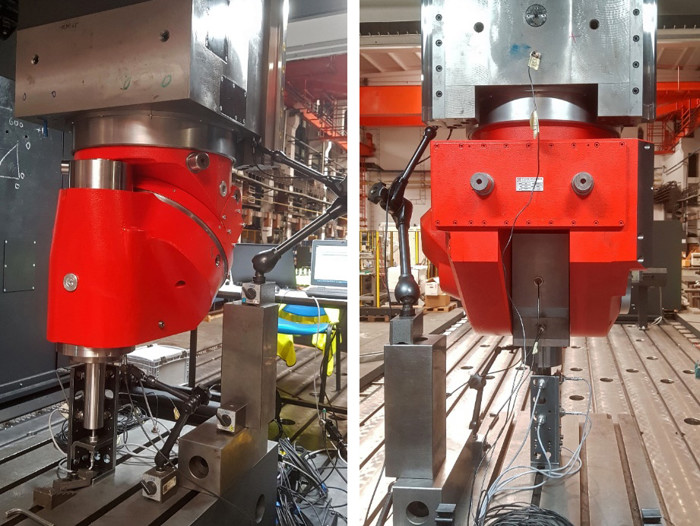
Functional sample Thermal Compensation System of Gantry Machining Centres FRF Geometrical Errors Based on Industry Hardware
Standards – Thermal deformation tests in a gantry machining centre FRFQ 250 VR/A8

Verified technology technology WAAM and DED Used to Create Welds on the Tool Steel 19552 – Measured material test results:
Hardness
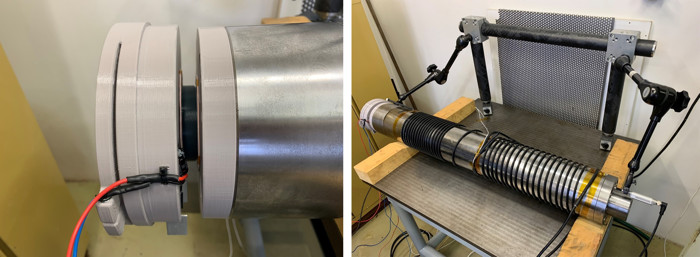
Functional sample Additional measurement of the extendable spindle with wireless power supply - Telescopic rotating spindle
with wireless power supply for static tests

Verified technology Efficient freeform milling on machines of the WHT series – Example of the result of tuning the machine
drive control (original state vs. tuned state)
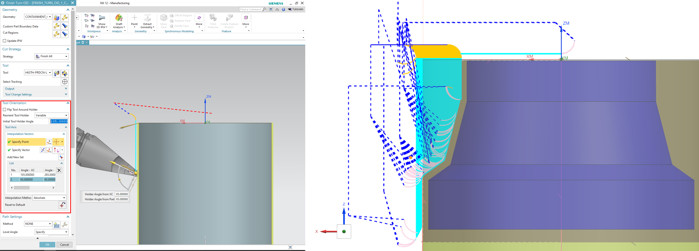
Verified technology The technology of productive multiaxis turning on multifunctional machines – Preparation of tool paths
in CAM using a rotary axis (left); Example of tool path composition on a Francis turbine blank (right)
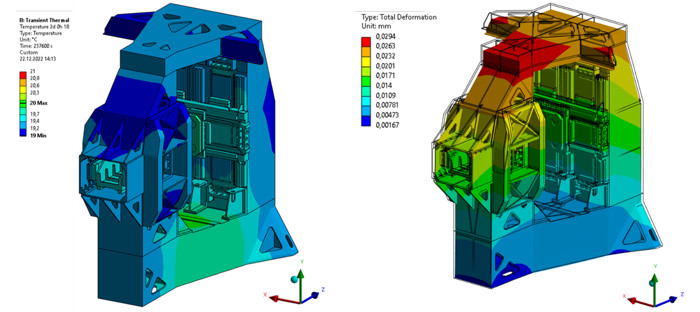
Functional sample Testing Equipment for Verifying the Thermomechanical Behaviour of Machine Tools - Thermal-mechanical analysis
of the LM2 Machine - Evaluation of Machine Deformations Due to Ambient Temperature Oscillations
The four-year stage of the NCCE project ended in 2022. The scope of cooperation between the consortium members involved, of whom there were 27 in total, was at a high level throughout the solution period, confirming the prerequisites for the successful completion of the project and the implementation of the results in industrial practice. In terms of its scope and application impact, this is an unprecedented and excellent project within the framework of the supported NCCs, which carries a strong R&D base of the domestic industry, with historical roots, the majority of the production of application companies of which is intended for export to demanding markets and must therefore be highly competitive. Implementing the achieved results helps this.
The researchers, the Council of the Centre and the management managed to ensure the implementation of the project despite the difficulties caused by all the crises that have affected and continue to affect the global world - in this case, primarily of a subcontracting nature with a lack of necessary components. The cooperation was of great benefit to all research organisations and industrial partners involved, as, among others, presented at the ceremonial part of the final opponent procedure on 20 April 2023. Some results have already been fully applied in industrial practice, and the commercialisation of other outputs is being prepared. The knowledge gained contributes to innovation and improvement of the products and products of the consortium members, thereby strengthening their competitiveness. Over the course of four years, a very strong consortium of research and production organisations has been created within the NCCE, gradually expanding to include other industrial partners and defining another research agenda that reflects future needs and trends and is also based on the joint know-how acquired while solving the NCCE project in 2019 - 2022. The plan was approved, and another NCCE 2 project is being implemented in 2023 - 2028. This will enable further deepening of mutual cooperation, support for the participation of young researchers, and, in particular, the creation of outputs supporting the development of Czech industry.
The TN01000015 project was co-financed from the state budget by the Technology agency of the Czech Republic under the National Competence Centers Programme.
Contact:
doc. Ing. Petr Kolář, Ph.D.
Department of Production Machines and Equipment FME CTU in Prague
E-mail: petr.kolar@fs.cvut.cz
Phone: +420 605 205 926
![[design/2014/cvut-logo-en-white.png]](https://fs.cvut.cz/content/images/design/2014/cvut-logo-en-white.png)
![[design/2014/cvut-logo-en-print.jpg]](https://fs.cvut.cz/content/images/design/2014/cvut-logo-en-print.jpg)
